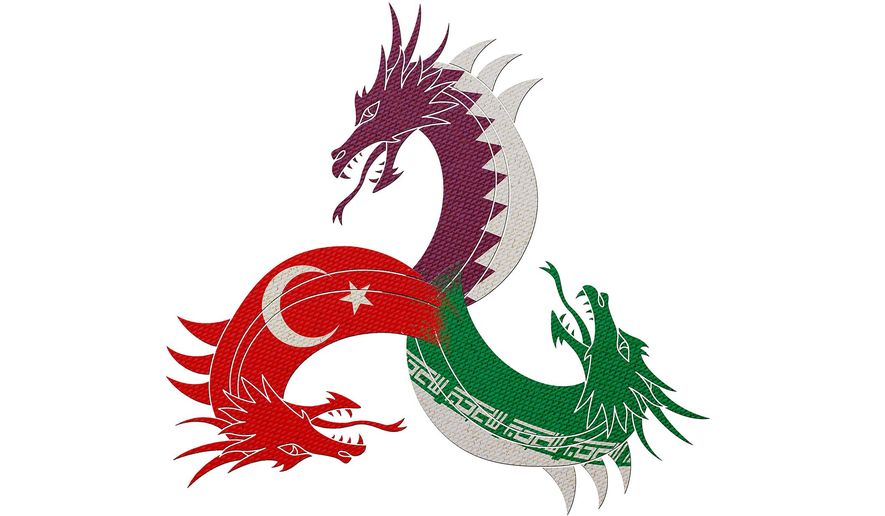OPINION:
Qatar’s role in undermining the stability of the Sunni Islamic world is undisputed, and is on a par with that of Iran. Qatar has used the Doha-based Al Jazeera media network to conduct a propaganda war against its Sunni rivals, and also provided massive funding for terrorist militias to undercut its less-jihadist Sunni neighbors.
Qatar’s destabilizing actions stand in dark contrast with President Trump’s successful participation in the first-ever Islamic America Summit, May 20-21. The two key objectives of that summit were to not only isolate Iran, but to also obtain agreement from all heads of state that concrete steps must immediately be taken to stop funds from going to terror groups, e.g., the Islamic State, al Qaeda, et al. In that sense, it was recognized at the summit that Qatar was a problem to a greater extent than other nations represented, as it openly supported various jihadi groups, particularly the Muslim Brotherhood at a very high level.
Not surprisingly, Saudi Arabia and its allies, Bahrain, United Arab Emirates (UAE) and Egypt, have turned on Qatar with a boycott. The Qatari leadership’s cozy relationship with Iran and the fact that Qatar serves as Iran’s banker and diplomatic proxy is not helpful. While the Saudi-led coalition initially placed 13 demands on Qatar, the primary concern was about Qatar’s relationship with Iran, which the coalition considers to be an existential threat to their regimes. Qatar’s support for the Muslim Brotherhood also figures into the decision to draw a line. Specifically, after the “Arab Spring” chaos, Saudi Arabia and the UAE saw the Muslim Brotherhood’s rise to power in Egypt as severely threatening. Compounding the problem was the Obama administration’s support for the Muslim Brotherhood, which only intensified their concern.
Qatar has rejected the 13 demands by the coalition. The Saudi-led coalition has now somewhat softened its original demands. It is understood that they are now asking Qatar to act on a set of principles that includes combating terrorism and so-called “extremism,” and denying financing and safe haven to terrorist groups.
The modified demands also include ending incitement of hatred and refraining from interfering in the internal affairs of other sovereign nations. Qatar’s emir, Tamim bin Hamad Al Thani has said he is open to dialogue. Qatar’s implementation of its recently signed memorandum of understanding with the United States on terror financing — which involves a commitment to arresting or expelling all those individuals or groups the U.S. has designated as supporting terrorism — is a step in the right direction, provided it follows through.
Aside from all of the above factors, there are reports that the “straw that broke the camel’s back” was the $1 billion ransom Qatar paid to free a group of 26 Qatari nationals kidnapped by the Iranian-backed Shiite militia Kata’ib Hezbollah while in Iraq in December 2015. Freed in the same deal were 50 other militants seized by jihadi groups in Syria, as reported in the Financial Times on June 5.
Complicating matters are the mixed signals coming from both Secretary of State Rex Tillerson and Secretary of Defense James Mattis. Mr. Tillerson’s ill-advised trip to Kuwait to try to mediate the boycott conflict before he had a solid plan for ending the standoff only added to the confusion. At this point, it is not clear that Mr. Tillerson, with Obama holdovers in key positions at State, is on the same page as the president, who has made it very clear that he is backing Saudi Arabia in this confrontation.
Further complicating matters was the hold placed by Sen. Bob Corker, chairman of the Senate Foreign Relations Committee, on all arms transfer to the Gulf Cooperation Council countries in the misguided belief that it will force the countries to come to an agreement without understanding that it is Qatar’s support for Iran, the Islamic State and the Muslim Brotherhood that is the key issue. Such a hold could jeopardize Mr. Trump’s marque $110 billion arms deal with Saudi Arabia.
Clearly, at this point, Mr. Trump must take charge and drive the U.S. position. Qatar must be disabused of its view that the use of its Al Udeid air base as the principal U.S. operating base in the Mideast is Doha’s best insurance policy to keep the U.S. on its side. If Qatar refuses to cooperate, we have to make it very clear we are prepared to move out of Al Udeid. The UAE has already indicated that it would be most pleased to host U.S. Central Command forces currently at Al Udeid and are prepared to greatly expand Emirati facilities to accommodate such a move. Such a serious threat should prompt Qatar to accept the coalition’s modified demands, using the retention of U.S. forces at Al Udeid as the justification.
The sale of $12 billion worth of jet fighter aircraft needs to be immediately postponed until the standoff is resolved. Further, the hold on arms sales to the Gulf Cooperation Council countries should be reviewed as it unnecessarily penalizes Saudi Arabia for equipment and munitions that it needs, and is in our national interest.
The gulf dispute, which has also drawn in the Muslim Brotherhood-aligned regime in Turkey on the side of Iran and Qatar, is more than a petty regional issue. President Trump has it right about the critical threat from an aggressive and nuclear-armed Iran, as well as the more insidious, subversive agenda of the Muslim Brotherhood. He needs to stick to his policy to counter the new Iran-Qatar-Turkey jihad axis.
• James A. Lyons, U.S. Navy retired admiral, was commander-in-chief of the U.S. Pacific Fleet and senior U.S. military representative to the United Nations.




Please read our comment policy before commenting.